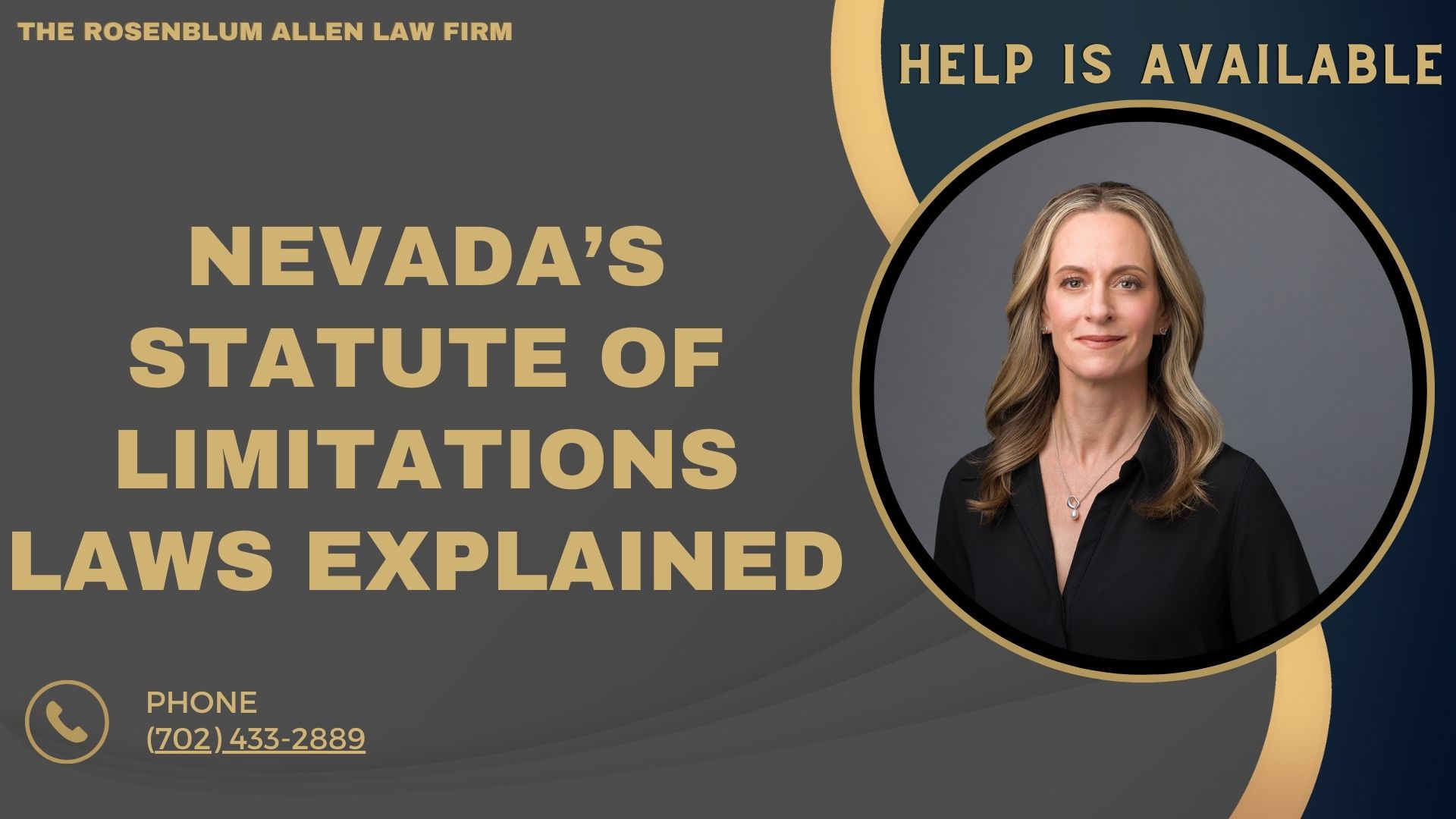The Nevada statute of limitations refers to the legal time limits within which an individual must file a lawsuit or take legal action. These time constraints exist to ensure legal matters are handled promptly, preventing cases from being brought up long after the evidence has deteriorated or witnesses are no longer available. Understanding the statute of limitations is crucial for anyone considering a legal claim in Nevada. If the statute of limitations expires, it can bar the pursuit of specific claims, leaving those affected without legal recourse.
This guide explores the Nevada statute of limitations for various legal claims, key exceptions, and how missing these time limits can impact your case.
What is the Nevada Statute of Limitations?
The statute of limitations is the law that sets the maximum time after an event within which legal proceedings may be initiated. The purpose is to protect defendants from indefinite legal threats and encourage the timely filing of claims. Each type of legal action has its specific time limit, starting from the event’s date or the injury’s discovery.
The statute of limitations varies depending on the nature of the claim—whether it’s civil, criminal, personal injury, or related to property disputes. Understanding the time limit that applies to your specific case is essential to avoid losing your right to file.
Why Does the Statute of Limitations Matter?
- Timeliness: It ensures legal actions are pursued while the evidence and witnesses are still available.
- Fairness: It helps avoid unfair situations where defendants face old claims with no chance of defending themselves adequately.
- Legal Protection: Without adhering to the statute, plaintiffs risk having their claims dismissed outright.
General Time Limits for Legal Actions in Nevada
In Nevada, different types of legal actions have varying statutes of limitations. Below is an overview of the general time limits for common types of claims in Nevada:
Civil Claims
- Breach of contract: 6 years from the date of the breach.
- Property damage: 3 years from the date of the damage.
- Personal injury: 2 years from the date of the injury.
- Libel or slander: 2 years from the date the defamation occurred.
Criminal Claims
- Felonies: Generally, there is no statute of limitations for serious felonies, such as murder.
- Misdemeanors: 1 year from the date the offense occurred.
- Gross misdemeanors: 2 years from the date the offense occurred.
Other Claims
- Wrongful death: 2 years from the date of death.
- Fraud: 3 years from the discovery of the fraud.
- Product liability: 6 years from the injury or 4 years from the date of discovery.
These general time limits give a broad understanding of when legal actions must be filed. Specific exceptions or extensions may apply depending on the circumstances, such as for minors or fraud claims.

Nevada Statute of Limitations for Personal Injury Cases
In Nevada, personal injury claims are one of the most common types of legal actions. These can arise from car accidents, slip-and-fall accidents, or medical malpractice. The statute of limitations for personal injury cases in Nevada is 2 years from the date the injury occurred or from the date the injury was discovered, whichever is later.
Key Exceptions and Extensions to the Statute of Limitations
- Discovery rule: If an injury isn’t immediately apparent, the statute of limitations may be extended. This applies to injuries like lead poisoning or certain medical conditions, where the harm becomes evident only after some time.
- Minors: If the injured person is a minor, the statute of limitations is extended. In Nevada, the statute of limitations for minors doesn’t begin to run until they turn 18, giving them until their 20th birthday to file a claim for personal injury.
How Time Limits Are Calculated
The statute of limitations for personal injury claims starts on the date of the injury. For example, if someone is injured in a car accident on January 1, the statute of limitations typically expires two years later. However, if the injury is discovered later, the timeline begins on the discovery date.
If you are unsure when the statute of limitations begins for your personal injury case, consulting an attorney is essential to determine your rights.
Nevada Statute of Limitations for Property Damage Claims
Property damage claims typically have a statute of limitations of 3 years in Nevada. This means that if your property is damaged—whether through a car accident, vandalism, or natural disasters—you must file a lawsuit within 3 years from the date of the damage.
Situations That Might Affect the Statute of Limitations for Property Damage
- Delayed discovery of damage: Property damage may not be immediately noticeable in some cases. For example, damage to your property isn’t apparent until later. In that case, you may still be able to file a claim based on the discovery date, similar to personal injury cases.
- Government involvement: Claims involving government entities might have shorter time limits and additional procedural requirements, such as filing a notice of claim before suing.
If you’re dealing with property damage, it’s essential to understand how the statute of limitations applies to your situation and act swiftly to preserve your rights.

Nevada Statute of Limitations for Criminal Cases
The statute of limitations for criminal cases in Nevada varies depending on the severity of the crime. It sets the time frame for the state to file charges against an individual. Once the statute of limitations expires, the accused cannot be prosecuted for the crime.
Felonies
For serious crimes like murder or sexual assault, Nevada has no statute of limitations. This means that charges can be filed at any time, even many years after the crime.
- Murder: No time limit for prosecution.
- Sexual assault: There is no time limit if the crime involves certain aggravating circumstances, like the use of force.
Misdemeanors
For misdemeanors, which are less severe offenses such as petty theft or simple assault, the statute of limitations is 1 year from the date the crime occurred.
- Petty theft
- Simple assault
- Public intoxication
Gross Misdemeanors
Gross misdemeanors, which are more serious than regular misdemeanors but less severe than felonies, have a two-year statute of limitations.
- Battery with substantial bodily harm
- Driving under the influence (DUI) causing injury
Exceptions and Tolling for Criminal Cases
There are situations where the statute of limitations might be extended or “tolled,” meaning it temporarily stops running. Here are some examples:
- Absence of the defendant: If the accused person is out of the state or deliberately avoiding prosecution, the statute of limitations may be paused.
- Minors and incapacity: For certain crimes, especially involving minors or victims with mental disabilities, the statute of limitations may be extended.
If you’ve been charged with a crime, it’s essential to consult an attorney to understand how the statute of limitations applies in your case.
Exceptional Circumstances That Impact the Statute of Limitations in Nevada
Various factors can influence the statute of limitations in Nevada. Sometimes, these circumstances can extend or change the filing deadlines. Let’s examine some of these special situations.
Cases Involving Government Entities
If you plan to sue a government agency, you must be careful about time limits. Nevada law requires that you file a notice of claim within a specific time frame before proceeding with a lawsuit against a government entity.
- Notice of claim: This is a formal notice to the government agency informing them of your intention to file a lawsuit.
- Time limit: For most government-related cases, you must file the notice of claim within 2 years of the incident.
You may lose the right to pursue the case if you don’t file within the designated time frame.
Claims Involving Minors or Mentally Incapacitated Individuals
For people who are minors or have mental disabilities, Nevada law allows the statute of limitations to be “tolled.” This means the clock doesn’t start running until the individual reaches a certain age or recovers from their disability.
- Minors: If the injured person is under 18, the statute of limitations doesn’t start until their 18th birthday. This can give them until they turn 20 to file a claim.
- Mentally incapacitated individuals: If a person is mentally incapacitated, the statute of limitations may be paused until they regain their mental competency.
Fraudulent Concealment
In some cases, the statute of limitations may be extended if the defendant actively concealed the facts of the case. This is often referred to as fraudulent concealment.
- Examples: If someone hid evidence or lied about the circumstances of the case, the statute of limitations might not start until the fraud is discovered.
In these instances, it’s essential to prove that the concealment occurred and to act quickly once you become aware of the situation.

How the Statute of Limitations Affects Divorce Cases in Nevada
If you’re considering divorce in Nevada, the statute of limitations is crucial in your case, including property division, alimony, and other family law matters. However, there is no statute of limitations for filing for divorce in Nevada. You can file for divorce anytime if you meet Nevada’s residency requirements.
The Residency Requirement
Before filing for divorce in Nevada, one of the spouses must have been a state resident for at least 6 weeks. This residency requirement is the only limitation to filing for divorce.
If you’re eligible to file, you don’t need to worry about a time limit for divorce. However, there are other time-sensitive issues related to divorce.
Impact on Property Division and Alimony
- Property division: Nevada is a community property state, meaning that assets acquired during the marriage are typically divided equally. There is no statute of limitations for requesting a fair property division, but you should act quickly to ensure all assets are considered.
- Alimony: Similarly, if you’re seeking alimony, the time limits related to property division apply, but there are no time constraints specifically for requesting alimony.
While the divorce doesn’t have a statute of limitations, timely action is crucial for ensuring a fair distribution of assets and support.
What Happens If You Miss the Statute of Limitations in Nevada?
Missing the statute of limitations can have significant consequences for your legal case. If you fail to file a lawsuit within the time limits, you may lose your right to pursue that claim.
Consequences of Missing the Statute of Limitations
- Case dismissal: The court may dismiss your case if you attempt to file after the statute of limitations has expired.
- Loss of legal rights: You may lose your right to compensation, property, or other legal remedies if you fail to file in time.
If you are close to missing the statute of limitations, it’s vital to take action immediately by consulting an attorney. Some cases may have exceptions or exceptional circumstances that could extend the time limit.

How to Calculate the Statute of Limitations for Your Case
Calculating the statute of limitations for your case is critical to filing your claim on time. The clock doesn’t always start ticking the moment an event occurs. Sometimes, it might begin later, depending on when the harm is discovered.
Here’s how to approach calculating the statute of limitations:
Starting Point: When Does the Clock Start?
The statute of limitations generally starts when the injury or issue occurs, but exceptions exist. Let’s break it down:
- Date of Injury or Event: For many personal injury or property damage claims, the clock starts the day the injury or damage happens.
- Date of Discovery: For claims like medical malpractice, where harm may not be evident immediately, the statute of limitations starts when the injury is discovered or should have been discovered.
- Date of Death: In wrongful death claims, the statute of limitations typically begins from the date of death rather than the date of the underlying incident.
Common Mistakes People Make When Calculating the Statute of Limitations
Some common mistakes can lead to missed deadlines. Here are a few:
- Assuming the clock starts on the event date: If you’re unsure when the statute begins, it’s safer to take it when you discover the injury or damage.
- Forgetting about tolling: The statute might be delayed in cases involving minors or mental incapacity. Forgetting these special rules can confuse.
- Not considering exceptions: The statute of limitations may be paused if fraud or concealment is involved. Make sure you know whether these exceptions apply.
If you’re unsure how to calculate the statute for your case, you must talk to an attorney who can help you determine the correct time frame.
How to File a Legal Claim Before the Statute of Limitations Expires
If you’re preparing to file a legal claim, it’s essential to do so before the statute of limitations. Here’s how to ensure you file on time:
Steps to Take Before Time Runs Out
- Consult an Attorney: Get advice from a legal professional specializing in the type of claim you’re filing. An attorney can help you determine the statute of limitations and ensure you file on time.
- Gather Evidence and Documentation: Start collecting evidence, documents, and witness statements that support your claim. The sooner you gather this, the better.
- File the Claim: Once you have all the necessary documents, your attorney will help you file the claim in court. Don’t wait until the last minute, as paperwork errors or delays in court filing can cost you valuable time.
- Double-Check Deadlines: Make sure you’ve confirmed the filing deadline for your specific case. Missing even a single day can result in losing your right to pursue the claim.
Importance of Timely Filing
Filing on time is critical to ensuring your case is heard. If you miss the statute of limitations, you may be permanently barred from pursuing your claim, even if you have strong evidence. Courts typically do not offer leniency in these cases, which makes timely filing essential.
The earlier you start the process, the better. This will give you plenty of time to address any issues or delays that may arise.

Exceptions to the Nevada Statute of Limitations
Although the statute of limitations generally sets strict deadlines, certain exceptions and exceptional circumstances can extend the filing period. These exceptions exist to ensure fairness, especially in cases where victims may not have been able to act promptly due to certain conditions.
Overview of When Exceptions May Apply
- Fraud: If the defendant concealed the facts of the case, the statute of limitations may be extended. This gives the plaintiff more time to discover the fraud and file a claim.
- Minors and Incapacity: If the person injured or wronged is a minor or mentally incapacitated, the statute of limitations might be paused until the individual reaches adulthood or regains capacity.
- Absence of Defendant: If the defendant is out of the state or avoiding prosecution, the statute of limitations may not start running until they return or are located.
Tolling the Statute of Limitations
Tolling refers to the temporary suspension of the statute of limitations. In Nevada, there are various situations where tolling might apply:
- Minors: As mentioned earlier, the statute of limitations doesn’t begin until the minor turns 18.
- Mental incapacity: If the person is mentally incapacitated, the statute is tolled until they recover or reach a level of competency.
- Defendant’s actions: If the defendant hides themselves to avoid being served, the statute might be paused until they’re found.
Tolling helps ensure that individuals facing extraordinary circumstances are not unfairly prevented from pursuing their claims.
Why Consulting an Attorney About the Statute of Limitations is Crucial
If you’re facing a legal issue and considering filing a lawsuit, you must speak with an attorney as soon as possible. A legal professional can clarify how the statute of limitations applies to your case and guide you through the process to ensure you don’t miss critical deadlines.
The Role of an Attorney in Statute of Limitations
An attorney helps in several ways:
- Clarifying the time limits: They can explain how the statute of limitations applies to your specific case and any exceptions that might apply.
- Identifying potential issues: An attorney can identify whether tolling or other exceptions are relevant to your case, potentially giving you more time to file.
- Handling paperwork and filing: Lawyers are experienced in preparing the necessary documents and ensuring everything is filed correctly before time runs out.
Peace of Mind
The legal process can be complex, especially when time is running out. Consulting an attorney ensures you take the proper steps and prevents costly mistakes. With the right support, you can focus on your case, knowing the timing issue is in good hands.

Breaking It All Down
Understanding the Nevada statute of limitations is vital to ensuring that your legal claims are filed on time and in compliance with state laws. Whether pursuing a personal injury case, dealing with property damage, or facing a criminal charge, knowing the time limits can make all the difference in your ability to seek justice.
While the statute of limitations provides necessary time constraints, it also comes with exceptions and circumstances that can impact your filing deadlines. By consulting with an experienced attorney and staying proactive, you can ensure your case is handled efficiently and within the legal time limits.
If you’re unsure about the statute of limitations for your case, don’t hesitate to seek legal guidance. Taking action sooner rather than later can help protect your rights and ensure the best possible outcome.

Frequently Asked Questions
What is the statute of limitations in Nevada?
The statute of limitations in Nevada is the legal time limit within which a person must file a lawsuit or initiate legal action. The time frame depends on the type of case, such as personal injury, property damage, or criminal charges. Once the statute of limitations expires, the right to file a claim is generally lost.
How long do I have to file a personal injury claim in Nevada?
In Nevada, you generally have 2 years from the date of the injury to file a personal injury claim. If the injury is not immediately discovered, the statute of limitations may be extended under the discovery rule. This means the clock starts when the injury should have been found.
What happens if I miss the statute of limitations in Nevada?
If you miss the statute of limitations, your case will likely be dismissed, and you will lose the right to pursue your claim. Filing within the required time frame is essential to avoid losing your opportunity for legal recourse.
Are there any exceptions to the statute of limitations in Nevada?
There are several exceptions where the statute of limitations may be extended or “tolled.” Some of the standard exceptions include:
- If the defendant fraudulently concealed the facts of the case.
- If the person filing the claim is a minor or mentally incapacitated.
- If the defendant is out of state or deliberately avoiding prosecution.
Can I file a lawsuit for property damage in Nevada? How long do I have?
Yes, you can file a lawsuit for property damage in Nevada. The statute of limitations for property damage claims is 3 years from the date of the incident. This includes damage caused by accidents, vandalism, or natural disasters.
Is there a statute of limitations for criminal cases in Nevada?
Yes, criminal cases in Nevada have different statutes of limitations based on the severity of the crime:
- Felonies: Generally, no statute of limitations (e.g., murder).
- Misdemeanors: 1 year from the date of the offense.
Gross misdemeanors: 2 years from the date of the offense.
When does the statute of limitations begin for my case?
The statute of limitations usually begins on the date the injury or damage occurred. However, in some cases (e.g., medical malpractice or fraud), the statute of limitations starts when the injury or fraud is discovered.
Can the statute of limitations be paused (tolled)?
Yes, the statute of limitations can be tolled in certain situations, such as:
- If the person filing the claim is a minor.
- If the person is mentally incapacitated.
- If the defendant is absent from the state or actively avoiding prosecution.
What if I'm unsure about the statute of limitations for my case?
If you’re unsure about the statute of limitations for your case, it’s best to consult with an attorney. A lawyer can help you determine the correct time frame for filing your claim and ensure you don’t miss any critical deadlines.

Additional Resources for You from The Rosenblum Allen Law Firm.
If you’re dealing with legal issues or seeking guidance, here are some resources from The Rosenblum Allen Law Firm that may be helpful. Each link includes a brief description of the service provided:
-
Criminal Defense Attorney
Need help with criminal charges? Our experienced attorneys are here to defend your rights and build a strong case on your behalf. -
Las Vegas DUI Lawyer
Facing a DUI charge in Las Vegas? Learn how we can help minimize penalties and protect your driving privileges. -
Domestic Violence Lawyer Las Vegas
If you’re facing domestic violence accusations, we offer compassionate and skilled representation tailored to your case. -
Drug Possession Lawyer
Charged with drug possession? Let us help you navigate the complexities of Nevada’s drug laws and protect your future. -
Sex Crimes Attorney
Accused of a sex crime? Our team provides sensitive and assertive defense to help safeguard your reputation and rights. -
CPS Defense Attorney
If you’re dealing with child abuse or neglect accusations, we’ll work tirelessly to protect your parental rights and your family. -
Misdemeanor Lawyer
Misdemeanor charges can still have serious consequences. Learn how we can help you minimize the impact. -
Las Vegas Warrant Defense Attorney
Got an active warrant in Las Vegas? We’ll help you address it and explore ways to resolve the situation favorably. -
Las Vegas Probation Violation Attorney
Violating probation can lead to harsh consequences. Let us help you navigate the legal process and protect your freedom. -
Theft Crime Defense Lawyer
Facing theft charges? Our attorneys are skilled at crafting defenses tailored to your situation to help achieve the best possible outcome. -
Kidnapping Lawyers
Accused of kidnapping? We provide strong representation to ensure your side of the story is heard. -
Juvenile Defense Lawyers
If your child is facing legal trouble, our juvenile defense attorneys are experienced in protecting minors’ rights and futures. -
Firearms Lawyer Las Vegas
Firearm-related legal matters can be complex. Whether it’s possession, use, or compliance issues, we’re here to help.

Offsite Resources for You
Here are some offsite resources related to the statute of limitations in Nevada that readers may find useful:
Nevada Judiciary: https://www.nvcourts.gov/
The official site for Nevada’s court system, where you can find resources on civil, criminal, and family law cases in Nevada.Nevada State Bar: https://www.nvbar.org/
A great resource for finding licensed attorneys in Nevada, legal guides, and information about laws in the state.Nevada Revised Statutes: https://www.leg.state.nv.us/
The official page for the Nevada Legislature, providing access to the full text of state statutes, including those related to the statute of limitations.American Bar Association (ABA): https://www.americanbar.org/
A reputable resource for national legal guidance, legal education, and articles on laws, including statutes of limitations across different states.FindLaw – Nevada Statute of Limitations: https://www.findlaw.com/
A comprehensive resource with legal guides and articles related to statutes of limitations and other important legal matters.Justia – Nevada Statutes: https://www.justia.com/
A site that offers free access to state laws, including Nevada’s statutes on personal injury, criminal law, and the statute of limitations.Nolo – Legal Guides: https://www.nolo.com/
Nolo provides helpful legal articles, self-help guides, and resources on a variety of legal topics, including statutes of limitations and legal claims.
These resources offer valuable information on Nevada’s legal landscape and can assist in understanding the statute of limitations and other legal concepts.

A Special Message from Our Lead Attorney, Molly Rosenblum Allen, Esq

Thank you for taking the time to read through these resources. I hope you found them helpful in understanding the statute of limitations and how it applies to your situation. If you have any questions or need assistance with your legal matter, my team and I are here to help.
Please don’t hesitate to give us a call at (702) 433-2889 to get the ball rolling on your case. We’re ready to support you every step of the way.
Warm regards,
Molly
The Rosenblum Allen Law Firm




